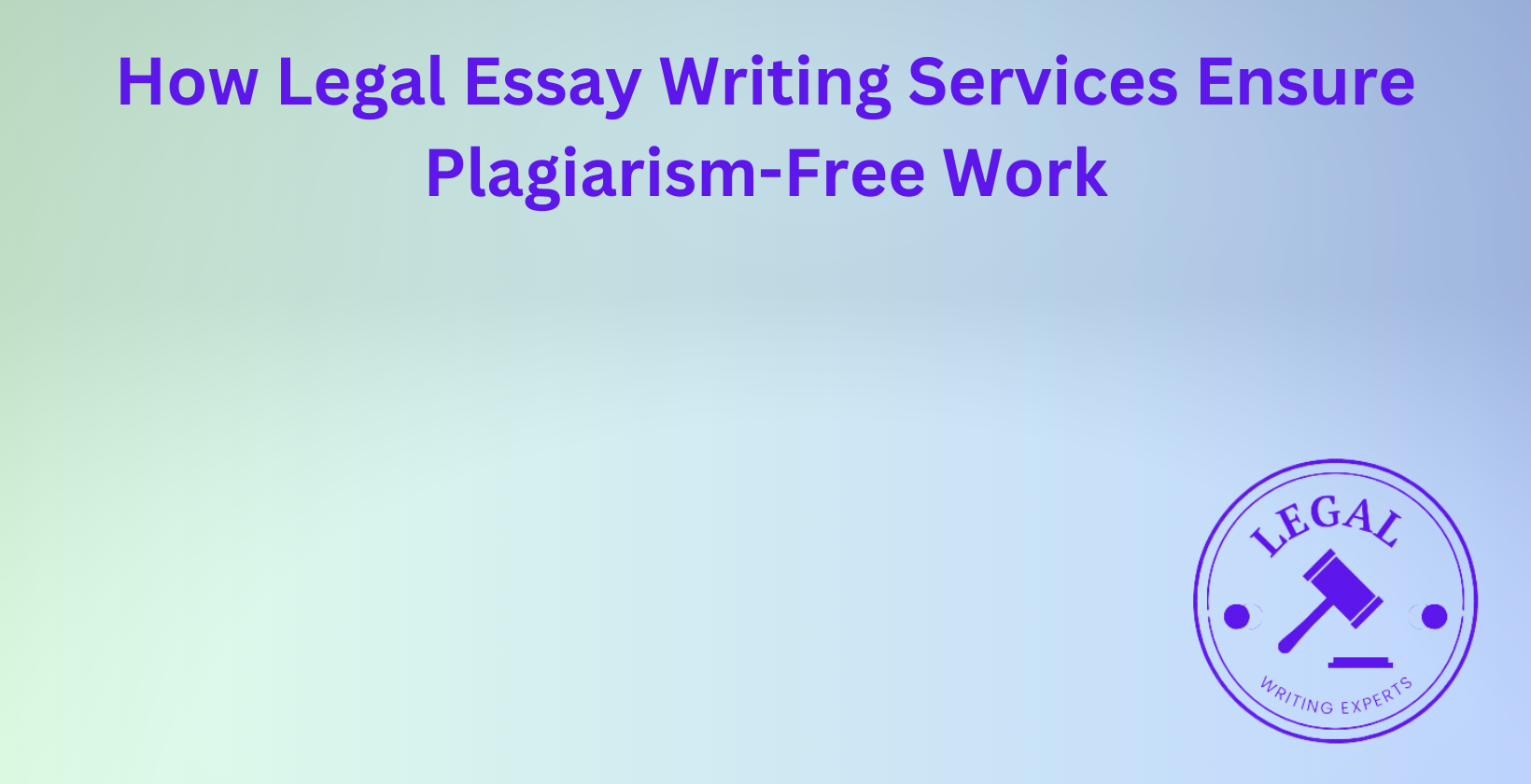How Legal Essay Writing Services Ensure Plagiarism-Free Work
Written by
Jessica E
January 24, 2025 · 8 min read

Legal essay writing services play a crucial role in assisting students with academic assignments by ensuring their work is original, professionally written, and plagiarism-free. These services provide expertly crafted legal essays, adhering to strict ethical standards and academic guidelines. This article explores how these services achieve plagiarism-free work, what plagiarism entails in legal writing, and how students can verify the authenticity of legal essays.
What Is Plagiarism in Legal Writing?
Plagiarism in legal writing is the act of presenting someone else’s work, ideas, or research as one’s own without proper acknowledgment. This includes copying verbatim from sources, paraphrasing without citation, or failing to credit authors for their intellectual contributions. Legal writing heavily relies on precedent and authoritative sources, making accurate attribution critical. Academic integrity in legal writing demands adherence to citation rules such as the Bluebook or OSCOLA guidelines to avoid plagiarism.
How Do Legal Essay Writing Services Ensure Originality?
Legal essay writing services ensure originality by employing experienced legal writers who create essays from scratch. These services require their writers to adhere to strict plagiarism policies and use reliable plagiarism detection tools to verify the uniqueness of the content. Writers are trained to conduct thorough research, cite sources correctly, and incorporate original analysis, ensuring the essays meet academic standards.
What Are the Consequences of Plagiarism in Legal Academia?
The consequences of plagiarism in legal academia are severe and can include academic penalties, reputational damage, and potential legal action. Students caught plagiarizing may face suspension, expulsion, or disqualification from exams. In professional settings, plagiarism can lead to loss of credibility, ethical violations, and disciplinary actions by regulatory bodies.
How Can Students Verify the Authenticity of Legal Essays?
Students can verify the authenticity of legal essays by requesting plagiarism reports from the writing service and reviewing citations for accuracy. Services providing legal essay help often include detailed bibliographies and use plagiarism detection tools to ensure content originality. Students should cross-check references and confirm that cited authorities are relevant to the essay’s arguments.
What Ethical Standards Do Reputable Legal Writing Services Follow?
Reputable legal writing services follow ethical standards by prioritizing academic integrity, transparency, and confidentiality. These services prohibit plagiarism, require proper citation of sources, and ensure compliance with university guidelines. They also maintain strict confidentiality agreements to protect client information.
How Do Legal Essay Writing Services Handle Source Citation?
Legal essay writing services handle source citation by adhering to recognized citation standards like the Bluebook, OSCOLA, or APA formats. Writers ensure all case laws, statutes, and secondary sources are accurately referenced. This practice not only prevents plagiarism but also enhances the credibility of the essay.
What Role Do Plagiarism Detection Tools Play in Legal Writing?
Plagiarism detection tools play a critical role in legal writing by identifying copied content and ensuring the originality of work. These tools, such as Turnitin and Grammarly, compare the essay against a vast database of academic publications, legal documents, and online content to detect similarities. Legal writing services use these tools to validate the uniqueness of their essays before submission.
How Can Students Avoid Unintentional Plagiarism in Legal Essays?
Students can avoid unintentional plagiarism in legal essays by understanding proper citation practices, using plagiarism detection tools, and maintaining clear notes during research. Paraphrasing correctly, crediting ideas, and including bibliographies are essential steps to uphold academic integrity. Seeking law assignment help from reputable services can also guide students in avoiding plagiarism pitfalls.
What Are the Best Practices for Citing Legal Sources?
The best practices for citing legal sources include following the required citation style, accurately referencing case law and statutes, and providing pinpoint citations for quoted material. For example, in the Bluebook style, court cases should include the case name, volume, reporter, and page number. These practices ensure clarity and credibility in legal essays.
How Do Legal Writing Services Train Their Writers to Prevent Plagiarism?
Legal writing services train their writers to prevent plagiarism through rigorous onboarding programs, workshops, and ongoing evaluations. Writers learn proper citation techniques, research methodologies, and ethical standards. They are also trained to use plagiarism detection tools and follow client-specific guidelines to produce authentic work.
What Measures Can Students Take to Ensure Their Work Is Plagiarism-Free?
Students can ensure their work is plagiarism-free by conducting original research, properly citing all sources, and using plagiarism detection software. Consulting with law essay writers for guidance and proofreading essays for citation errors are effective steps to maintain originality. Keeping detailed research notes and avoiding copy-pasting from sources further reduces the risk of plagiarism.
How Do Legal Essay Writing Services Maintain Academic Integrity?
Legal essay writing services maintain academic integrity by adhering to anti-plagiarism policies, employing qualified legal writers, and ensuring proper citation in all assignments. These services foster transparency by providing plagiarism reports, detailed bibliographies, and clear communication with clients. By emphasizing quality and originality, they uphold the academic standards required in legal education.


